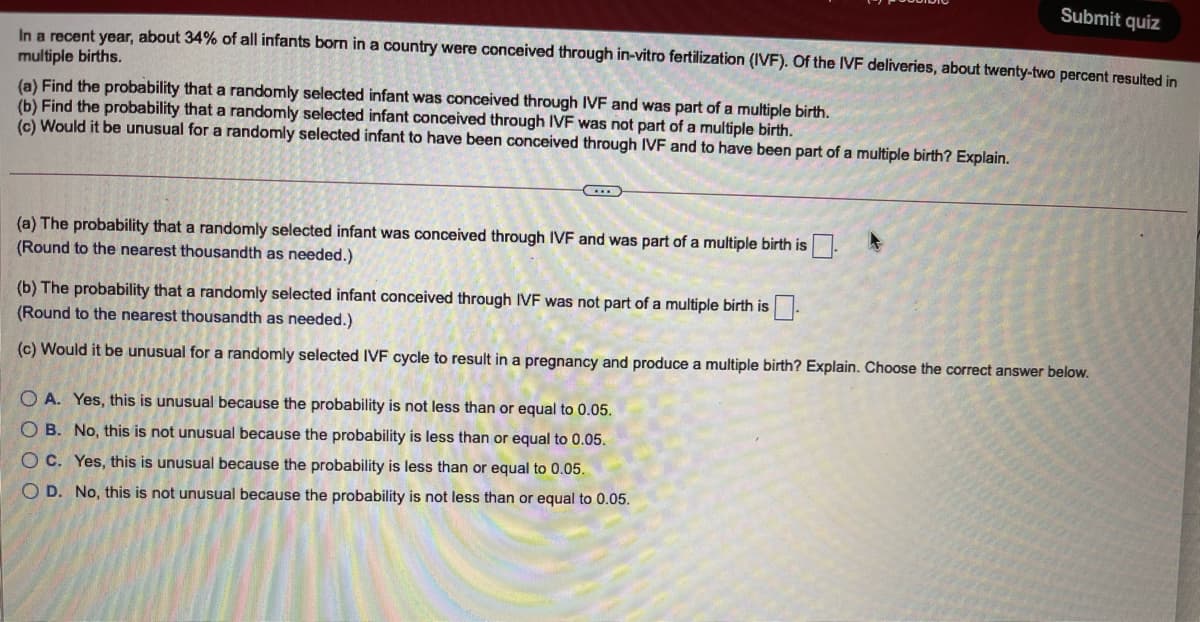Submit quiz In a recent year, about 34% of all infants born in a country were conceived through in-vitro fertilization (IVF). Of the IVF deliveries, about twenty-two percent resulted in multiple births. (a) Find the probability that a randomly selected infant was conceived through IVF and was part of a multiple birth. (b) Find the probability that a randomly selected infant conceived through IVF was not part of a multiple birth. (c) Would it be unusual for a randomly selected infant to have been conceived through IVF and to have been part of a multiple birth? Explain. (a) The probability that a randomly selected infant was conceived through IVF and was part of a multiple birth is (Round to the nearest thousandth as needed.) (b) The probability that a randomly selected infant conceived through IVF was not part of a multiple birth is (Round to the nearest thousandth as needed.) (c) Would it be unusual for a randomly selected IVF cycle to result in a pregnancy and produce a multiple birth? Explain. Choose the correct answer below. O A. Yes, this is unusual because the probability is not less than or equal to 0.05. O B. No, this is not unusual because the probability is less than or equal to 0.05. O C. Yes, this is unusual because the probability is less than or equal to 0.05. O D. No, this is not unusual because the probability is not less than or equal to 0.05.
Submit quiz In a recent year, about 34% of all infants born in a country were conceived through in-vitro fertilization (IVF). Of the IVF deliveries, about twenty-two percent resulted in multiple births. (a) Find the probability that a randomly selected infant was conceived through IVF and was part of a multiple birth. (b) Find the probability that a randomly selected infant conceived through IVF was not part of a multiple birth. (c) Would it be unusual for a randomly selected infant to have been conceived through IVF and to have been part of a multiple birth? Explain. (a) The probability that a randomly selected infant was conceived through IVF and was part of a multiple birth is (Round to the nearest thousandth as needed.) (b) The probability that a randomly selected infant conceived through IVF was not part of a multiple birth is (Round to the nearest thousandth as needed.) (c) Would it be unusual for a randomly selected IVF cycle to result in a pregnancy and produce a multiple birth? Explain. Choose the correct answer below. O A. Yes, this is unusual because the probability is not less than or equal to 0.05. O B. No, this is not unusual because the probability is less than or equal to 0.05. O C. Yes, this is unusual because the probability is less than or equal to 0.05. O D. No, this is not unusual because the probability is not less than or equal to 0.05.
Chapter8: Sequences, Series,and Probability
Section: Chapter Questions
Problem 18T: You attend a karaoke night and hope to hear your favorite song. The karaoke song book has 300...
Related questions
Question

Transcribed Image Text:Submit quiz
In a recent year, about 34% of all infants born in a country were conceived through in-vitro fertilization (IVF). Of the IVF deliveries, about twenty-two percent resulted in
multiple births.
(a) Find the probability that a randomly selected infant was conceived through IVF and was part of a multiple birth.
(b) Find the probability that a randomly selected infant conceived through IVF was not part of a multiple birth.
(c) Would it be unusual for a randomly selected infant to have been conceived through IVF and to have been part of a multiple birth? Explain.
(a) The probability that a randomly selected infant was conceived through IVF and was part of a multiple birth is
(Round to the nearest thousandth as needed.)
(b) The probability that a randomly selected infant conceived through IVF was not part of a multiple birth is
(Round to the nearest thousandth as needed.)
(c) Would it be unusual for a randomly selected IVF cycle to result in a pregnancy and produce a multiple birth? Explain. Choose the correct answer below.
O A. Yes, this is unusual because the probability is not less than or equal to 0.05.
O B. No, this is not unusual because the probability is less than or equal to 0.05.
OC. Yes, this is unusual because the probability is less than or equal to 0.05.
O D. No, this is not unusual because the probability is not less than or equal to 0.05.
Expert Solution
This question has been solved!
Explore an expertly crafted, step-by-step solution for a thorough understanding of key concepts.
This is a popular solution!
Trending now
This is a popular solution!
Step by step
Solved in 2 steps with 2 images

Recommended textbooks for you

